La Trobe University LST2BSL Business Law Assignment
VerifiedAdded on 2022/11/16
|9
|1648
|154
Homework Assignment
AI Summary
This business law assignment solution addresses several key legal issues within a business context. The assignment begins by examining whether a statement made about a product constitutes a term of a contract, representation, puffery, or an opinion. It then explores the validity of an exclusion clause hidden from the buyer's view. The solution further analyzes the applicability of promissory estoppel against a party who made a promise, assessing the required elements for its implementation. Finally, the assignment considers the enforceability of an exclusion clause printed on a sticker for future clients, focusing on the importance of visibility and acknowledgment. The solution cites relevant case law to support its arguments and conclusions.
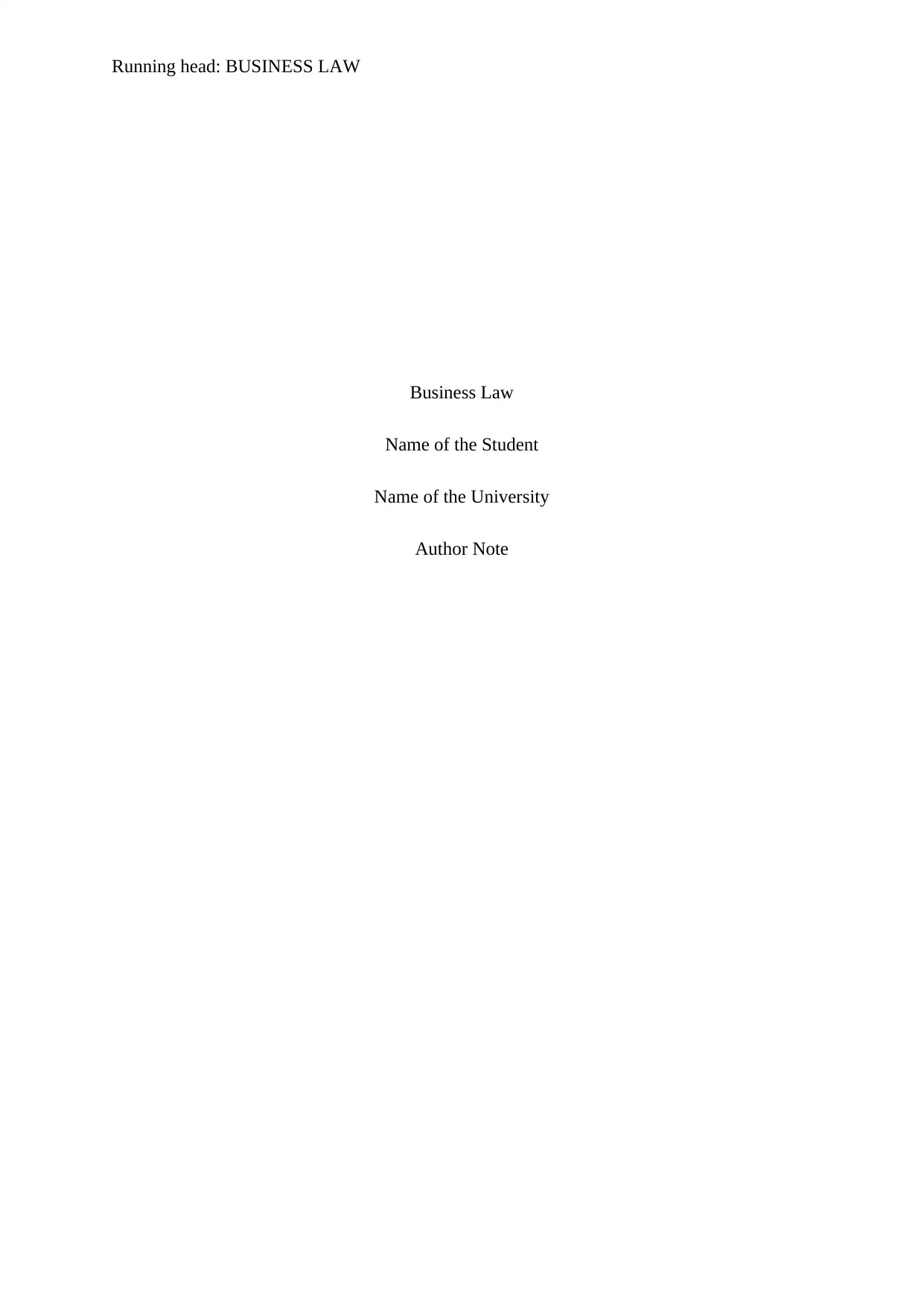
Running head: BUSINESS LAW
Business Law
Name of the Student
Name of the University
Author Note
Business Law
Name of the Student
Name of the University
Author Note
Paraphrase This Document
Need a fresh take? Get an instant paraphrase of this document with our AI Paraphraser
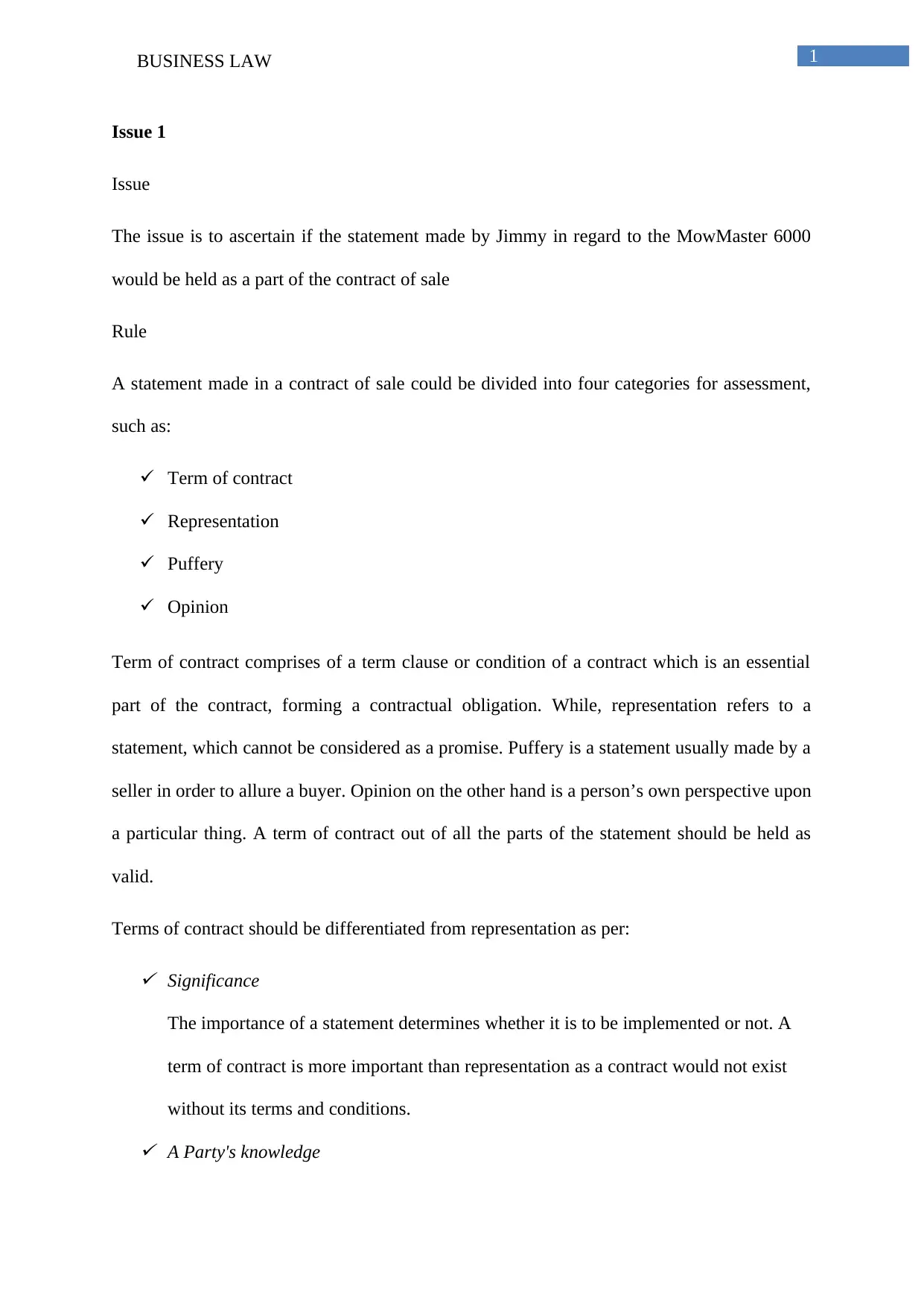
1BUSINESS LAW
Issue 1
Issue
The issue is to ascertain if the statement made by Jimmy in regard to the MowMaster 6000
would be held as a part of the contract of sale
Rule
A statement made in a contract of sale could be divided into four categories for assessment,
such as:
Term of contract
Representation
Puffery
Opinion
Term of contract comprises of a term clause or condition of a contract which is an essential
part of the contract, forming a contractual obligation. While, representation refers to a
statement, which cannot be considered as a promise. Puffery is a statement usually made by a
seller in order to allure a buyer. Opinion on the other hand is a person’s own perspective upon
a particular thing. A term of contract out of all the parts of the statement should be held as
valid.
Terms of contract should be differentiated from representation as per:
Significance
The importance of a statement determines whether it is to be implemented or not. A
term of contract is more important than representation as a contract would not exist
without its terms and conditions. A Party's knowledge
Issue 1
Issue
The issue is to ascertain if the statement made by Jimmy in regard to the MowMaster 6000
would be held as a part of the contract of sale
Rule
A statement made in a contract of sale could be divided into four categories for assessment,
such as:
Term of contract
Representation
Puffery
Opinion
Term of contract comprises of a term clause or condition of a contract which is an essential
part of the contract, forming a contractual obligation. While, representation refers to a
statement, which cannot be considered as a promise. Puffery is a statement usually made by a
seller in order to allure a buyer. Opinion on the other hand is a person’s own perspective upon
a particular thing. A term of contract out of all the parts of the statement should be held as
valid.
Terms of contract should be differentiated from representation as per:
Significance
The importance of a statement determines whether it is to be implemented or not. A
term of contract is more important than representation as a contract would not exist
without its terms and conditions. A Party's knowledge
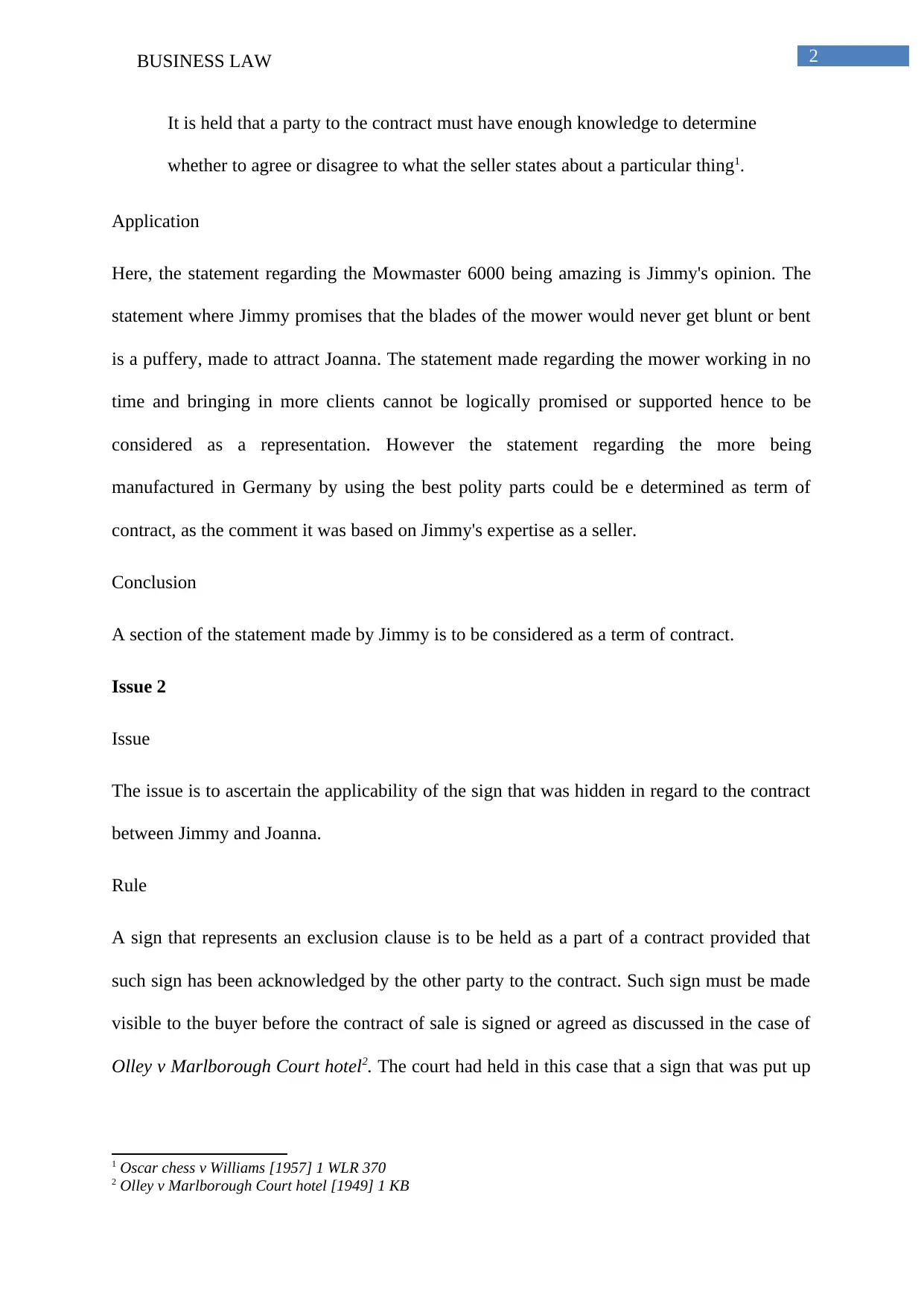
2BUSINESS LAW
It is held that a party to the contract must have enough knowledge to determine
whether to agree or disagree to what the seller states about a particular thing1.
Application
Here, the statement regarding the Mowmaster 6000 being amazing is Jimmy's opinion. The
statement where Jimmy promises that the blades of the mower would never get blunt or bent
is a puffery, made to attract Joanna. The statement made regarding the mower working in no
time and bringing in more clients cannot be logically promised or supported hence to be
considered as a representation. However the statement regarding the more being
manufactured in Germany by using the best polity parts could be e determined as term of
contract, as the comment it was based on Jimmy's expertise as a seller.
Conclusion
A section of the statement made by Jimmy is to be considered as a term of contract.
Issue 2
Issue
The issue is to ascertain the applicability of the sign that was hidden in regard to the contract
between Jimmy and Joanna.
Rule
A sign that represents an exclusion clause is to be held as a part of a contract provided that
such sign has been acknowledged by the other party to the contract. Such sign must be made
visible to the buyer before the contract of sale is signed or agreed as discussed in the case of
Olley v Marlborough Court hotel2. The court had held in this case that a sign that was put up
1 Oscar chess v Williams [1957] 1 WLR 370
2 Olley v Marlborough Court hotel [1949] 1 KB
It is held that a party to the contract must have enough knowledge to determine
whether to agree or disagree to what the seller states about a particular thing1.
Application
Here, the statement regarding the Mowmaster 6000 being amazing is Jimmy's opinion. The
statement where Jimmy promises that the blades of the mower would never get blunt or bent
is a puffery, made to attract Joanna. The statement made regarding the mower working in no
time and bringing in more clients cannot be logically promised or supported hence to be
considered as a representation. However the statement regarding the more being
manufactured in Germany by using the best polity parts could be e determined as term of
contract, as the comment it was based on Jimmy's expertise as a seller.
Conclusion
A section of the statement made by Jimmy is to be considered as a term of contract.
Issue 2
Issue
The issue is to ascertain the applicability of the sign that was hidden in regard to the contract
between Jimmy and Joanna.
Rule
A sign that represents an exclusion clause is to be held as a part of a contract provided that
such sign has been acknowledged by the other party to the contract. Such sign must be made
visible to the buyer before the contract of sale is signed or agreed as discussed in the case of
Olley v Marlborough Court hotel2. The court had held in this case that a sign that was put up
1 Oscar chess v Williams [1957] 1 WLR 370
2 Olley v Marlborough Court hotel [1949] 1 KB
⊘ This is a preview!⊘
Do you want full access?
Subscribe today to unlock all pages.

Trusted by 1+ million students worldwide
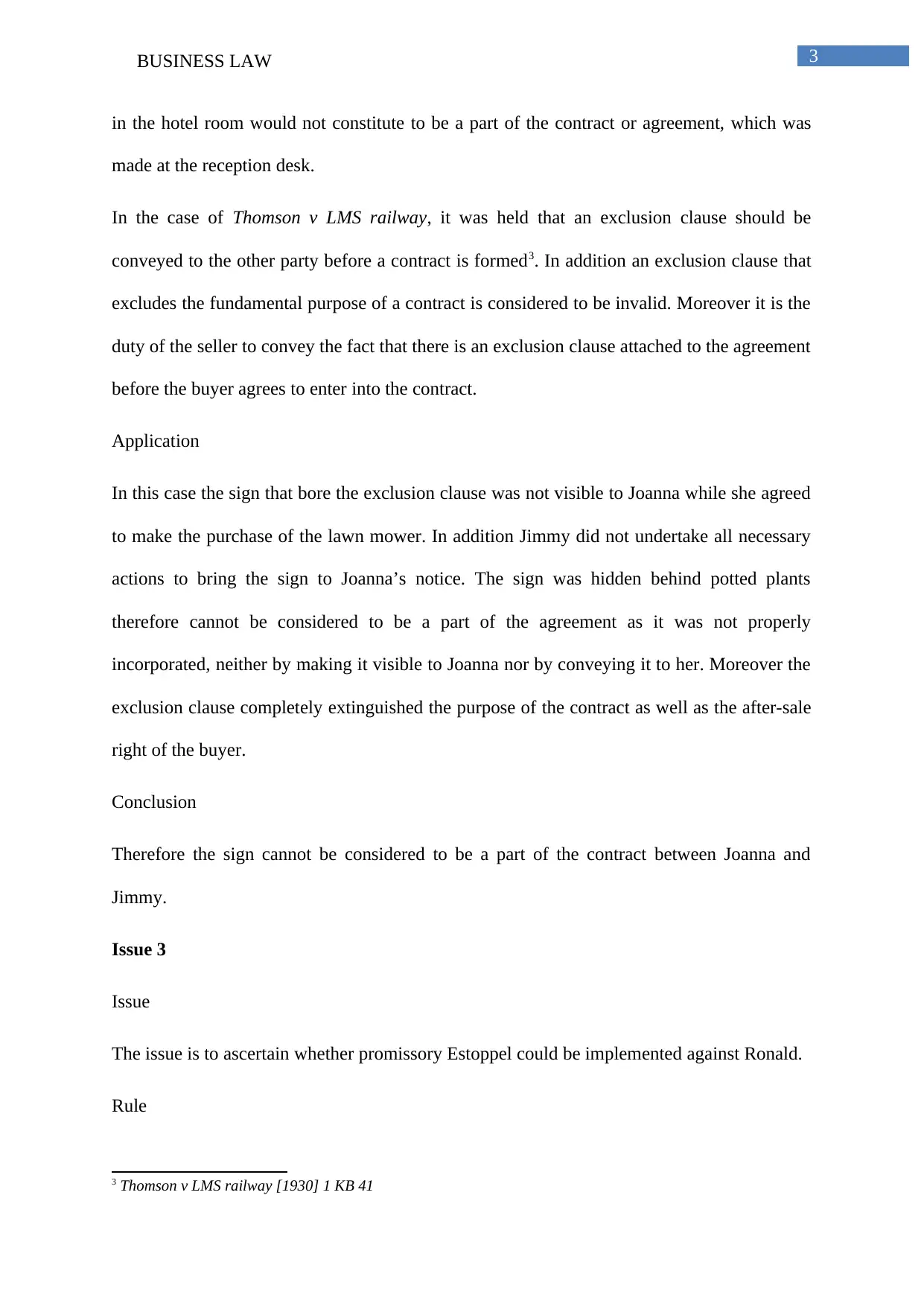
3BUSINESS LAW
in the hotel room would not constitute to be a part of the contract or agreement, which was
made at the reception desk.
In the case of Thomson v LMS railway, it was held that an exclusion clause should be
conveyed to the other party before a contract is formed3. In addition an exclusion clause that
excludes the fundamental purpose of a contract is considered to be invalid. Moreover it is the
duty of the seller to convey the fact that there is an exclusion clause attached to the agreement
before the buyer agrees to enter into the contract.
Application
In this case the sign that bore the exclusion clause was not visible to Joanna while she agreed
to make the purchase of the lawn mower. In addition Jimmy did not undertake all necessary
actions to bring the sign to Joanna’s notice. The sign was hidden behind potted plants
therefore cannot be considered to be a part of the agreement as it was not properly
incorporated, neither by making it visible to Joanna nor by conveying it to her. Moreover the
exclusion clause completely extinguished the purpose of the contract as well as the after-sale
right of the buyer.
Conclusion
Therefore the sign cannot be considered to be a part of the contract between Joanna and
Jimmy.
Issue 3
Issue
The issue is to ascertain whether promissory Estoppel could be implemented against Ronald.
Rule
3 Thomson v LMS railway [1930] 1 KB 41
in the hotel room would not constitute to be a part of the contract or agreement, which was
made at the reception desk.
In the case of Thomson v LMS railway, it was held that an exclusion clause should be
conveyed to the other party before a contract is formed3. In addition an exclusion clause that
excludes the fundamental purpose of a contract is considered to be invalid. Moreover it is the
duty of the seller to convey the fact that there is an exclusion clause attached to the agreement
before the buyer agrees to enter into the contract.
Application
In this case the sign that bore the exclusion clause was not visible to Joanna while she agreed
to make the purchase of the lawn mower. In addition Jimmy did not undertake all necessary
actions to bring the sign to Joanna’s notice. The sign was hidden behind potted plants
therefore cannot be considered to be a part of the agreement as it was not properly
incorporated, neither by making it visible to Joanna nor by conveying it to her. Moreover the
exclusion clause completely extinguished the purpose of the contract as well as the after-sale
right of the buyer.
Conclusion
Therefore the sign cannot be considered to be a part of the contract between Joanna and
Jimmy.
Issue 3
Issue
The issue is to ascertain whether promissory Estoppel could be implemented against Ronald.
Rule
3 Thomson v LMS railway [1930] 1 KB 41
Paraphrase This Document
Need a fresh take? Get an instant paraphrase of this document with our AI Paraphraser
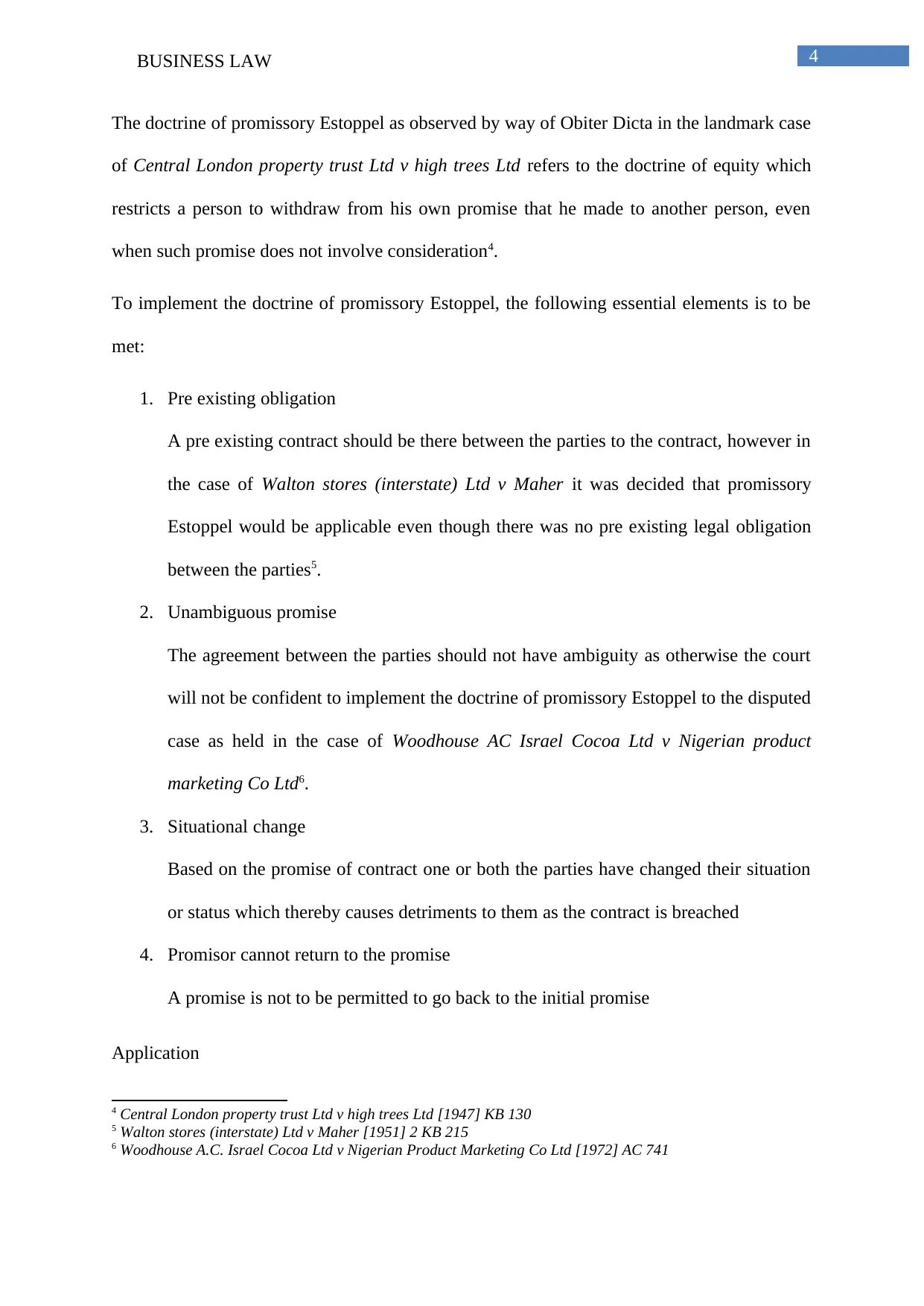
4BUSINESS LAW
The doctrine of promissory Estoppel as observed by way of Obiter Dicta in the landmark case
of Central London property trust Ltd v high trees Ltd refers to the doctrine of equity which
restricts a person to withdraw from his own promise that he made to another person, even
when such promise does not involve consideration4.
To implement the doctrine of promissory Estoppel, the following essential elements is to be
met:
1. Pre existing obligation
A pre existing contract should be there between the parties to the contract, however in
the case of Walton stores (interstate) Ltd v Maher it was decided that promissory
Estoppel would be applicable even though there was no pre existing legal obligation
between the parties5.
2. Unambiguous promise
The agreement between the parties should not have ambiguity as otherwise the court
will not be confident to implement the doctrine of promissory Estoppel to the disputed
case as held in the case of Woodhouse AC Israel Cocoa Ltd v Nigerian product
marketing Co Ltd6.
3. Situational change
Based on the promise of contract one or both the parties have changed their situation
or status which thereby causes detriments to them as the contract is breached
4. Promisor cannot return to the promise
A promise is not to be permitted to go back to the initial promise
Application
4 Central London property trust Ltd v high trees Ltd [1947] KB 130
5 Walton stores (interstate) Ltd v Maher [1951] 2 KB 215
6 Woodhouse A.C. Israel Cocoa Ltd v Nigerian Product Marketing Co Ltd [1972] AC 741
The doctrine of promissory Estoppel as observed by way of Obiter Dicta in the landmark case
of Central London property trust Ltd v high trees Ltd refers to the doctrine of equity which
restricts a person to withdraw from his own promise that he made to another person, even
when such promise does not involve consideration4.
To implement the doctrine of promissory Estoppel, the following essential elements is to be
met:
1. Pre existing obligation
A pre existing contract should be there between the parties to the contract, however in
the case of Walton stores (interstate) Ltd v Maher it was decided that promissory
Estoppel would be applicable even though there was no pre existing legal obligation
between the parties5.
2. Unambiguous promise
The agreement between the parties should not have ambiguity as otherwise the court
will not be confident to implement the doctrine of promissory Estoppel to the disputed
case as held in the case of Woodhouse AC Israel Cocoa Ltd v Nigerian product
marketing Co Ltd6.
3. Situational change
Based on the promise of contract one or both the parties have changed their situation
or status which thereby causes detriments to them as the contract is breached
4. Promisor cannot return to the promise
A promise is not to be permitted to go back to the initial promise
Application
4 Central London property trust Ltd v high trees Ltd [1947] KB 130
5 Walton stores (interstate) Ltd v Maher [1951] 2 KB 215
6 Woodhouse A.C. Israel Cocoa Ltd v Nigerian Product Marketing Co Ltd [1972] AC 741
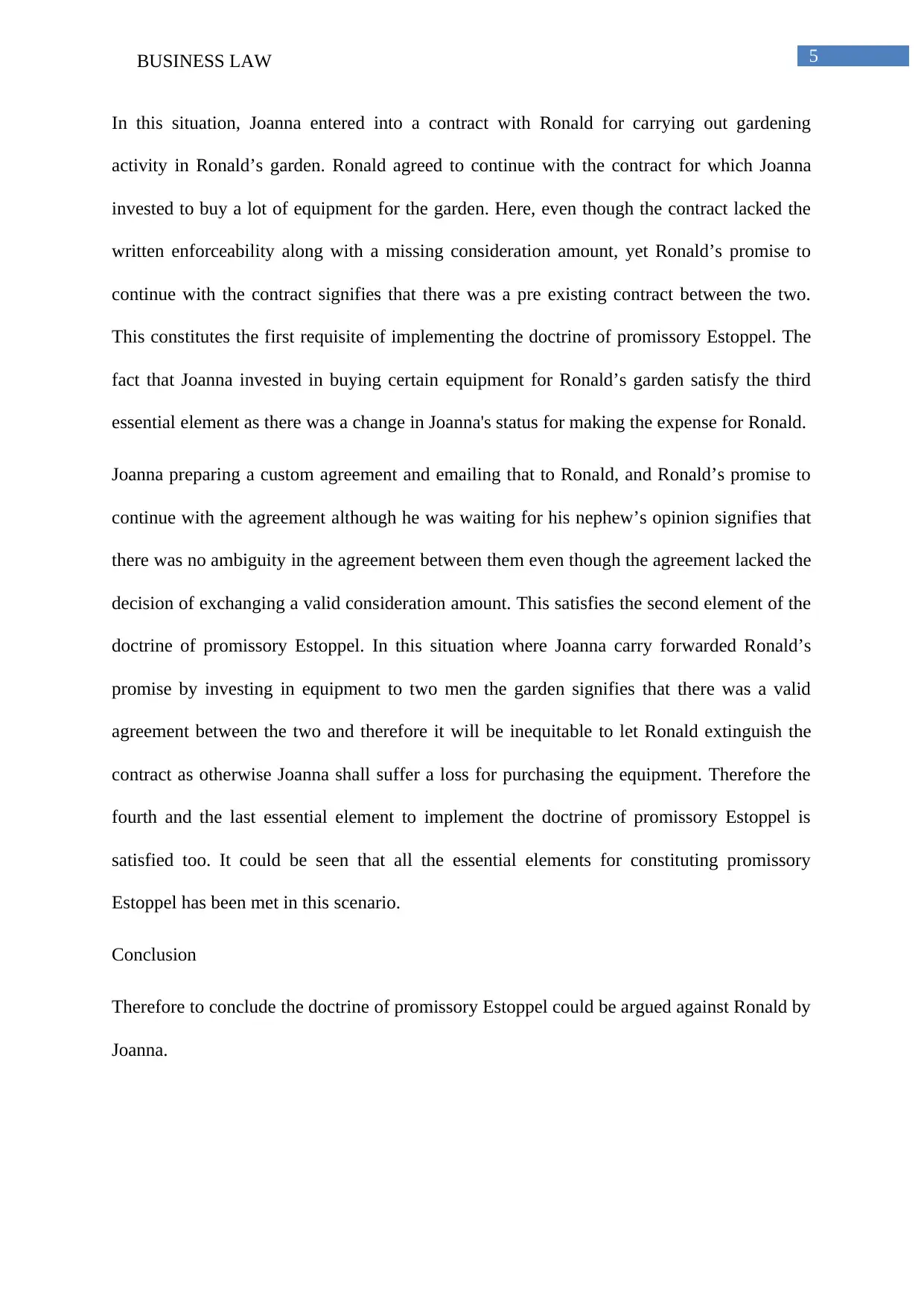
5BUSINESS LAW
In this situation, Joanna entered into a contract with Ronald for carrying out gardening
activity in Ronald’s garden. Ronald agreed to continue with the contract for which Joanna
invested to buy a lot of equipment for the garden. Here, even though the contract lacked the
written enforceability along with a missing consideration amount, yet Ronald’s promise to
continue with the contract signifies that there was a pre existing contract between the two.
This constitutes the first requisite of implementing the doctrine of promissory Estoppel. The
fact that Joanna invested in buying certain equipment for Ronald’s garden satisfy the third
essential element as there was a change in Joanna's status for making the expense for Ronald.
Joanna preparing a custom agreement and emailing that to Ronald, and Ronald’s promise to
continue with the agreement although he was waiting for his nephew’s opinion signifies that
there was no ambiguity in the agreement between them even though the agreement lacked the
decision of exchanging a valid consideration amount. This satisfies the second element of the
doctrine of promissory Estoppel. In this situation where Joanna carry forwarded Ronald’s
promise by investing in equipment to two men the garden signifies that there was a valid
agreement between the two and therefore it will be inequitable to let Ronald extinguish the
contract as otherwise Joanna shall suffer a loss for purchasing the equipment. Therefore the
fourth and the last essential element to implement the doctrine of promissory Estoppel is
satisfied too. It could be seen that all the essential elements for constituting promissory
Estoppel has been met in this scenario.
Conclusion
Therefore to conclude the doctrine of promissory Estoppel could be argued against Ronald by
Joanna.
In this situation, Joanna entered into a contract with Ronald for carrying out gardening
activity in Ronald’s garden. Ronald agreed to continue with the contract for which Joanna
invested to buy a lot of equipment for the garden. Here, even though the contract lacked the
written enforceability along with a missing consideration amount, yet Ronald’s promise to
continue with the contract signifies that there was a pre existing contract between the two.
This constitutes the first requisite of implementing the doctrine of promissory Estoppel. The
fact that Joanna invested in buying certain equipment for Ronald’s garden satisfy the third
essential element as there was a change in Joanna's status for making the expense for Ronald.
Joanna preparing a custom agreement and emailing that to Ronald, and Ronald’s promise to
continue with the agreement although he was waiting for his nephew’s opinion signifies that
there was no ambiguity in the agreement between them even though the agreement lacked the
decision of exchanging a valid consideration amount. This satisfies the second element of the
doctrine of promissory Estoppel. In this situation where Joanna carry forwarded Ronald’s
promise by investing in equipment to two men the garden signifies that there was a valid
agreement between the two and therefore it will be inequitable to let Ronald extinguish the
contract as otherwise Joanna shall suffer a loss for purchasing the equipment. Therefore the
fourth and the last essential element to implement the doctrine of promissory Estoppel is
satisfied too. It could be seen that all the essential elements for constituting promissory
Estoppel has been met in this scenario.
Conclusion
Therefore to conclude the doctrine of promissory Estoppel could be argued against Ronald by
Joanna.
⊘ This is a preview!⊘
Do you want full access?
Subscribe today to unlock all pages.

Trusted by 1+ million students worldwide
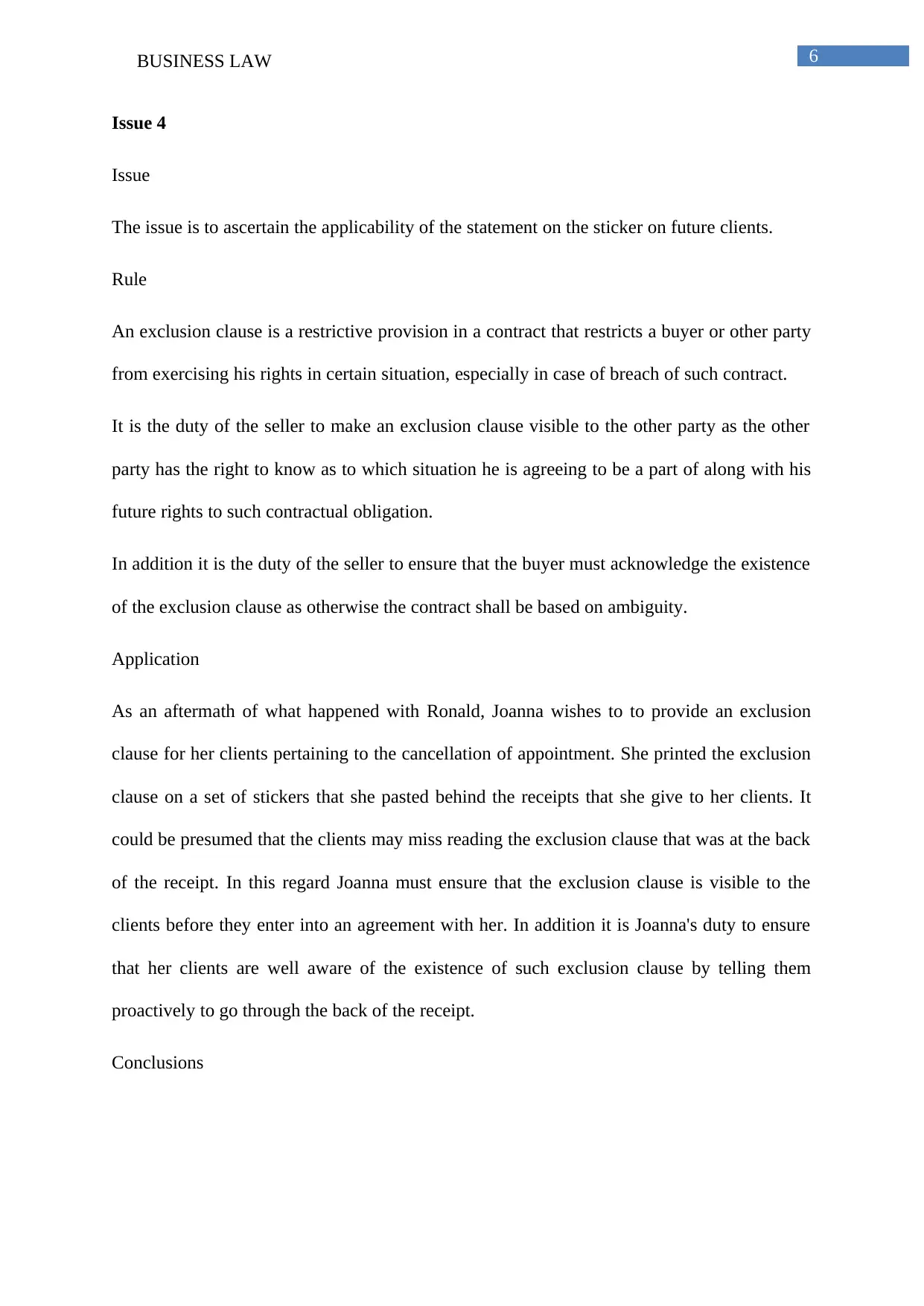
6BUSINESS LAW
Issue 4
Issue
The issue is to ascertain the applicability of the statement on the sticker on future clients.
Rule
An exclusion clause is a restrictive provision in a contract that restricts a buyer or other party
from exercising his rights in certain situation, especially in case of breach of such contract.
It is the duty of the seller to make an exclusion clause visible to the other party as the other
party has the right to know as to which situation he is agreeing to be a part of along with his
future rights to such contractual obligation.
In addition it is the duty of the seller to ensure that the buyer must acknowledge the existence
of the exclusion clause as otherwise the contract shall be based on ambiguity.
Application
As an aftermath of what happened with Ronald, Joanna wishes to to provide an exclusion
clause for her clients pertaining to the cancellation of appointment. She printed the exclusion
clause on a set of stickers that she pasted behind the receipts that she give to her clients. It
could be presumed that the clients may miss reading the exclusion clause that was at the back
of the receipt. In this regard Joanna must ensure that the exclusion clause is visible to the
clients before they enter into an agreement with her. In addition it is Joanna's duty to ensure
that her clients are well aware of the existence of such exclusion clause by telling them
proactively to go through the back of the receipt.
Conclusions
Issue 4
Issue
The issue is to ascertain the applicability of the statement on the sticker on future clients.
Rule
An exclusion clause is a restrictive provision in a contract that restricts a buyer or other party
from exercising his rights in certain situation, especially in case of breach of such contract.
It is the duty of the seller to make an exclusion clause visible to the other party as the other
party has the right to know as to which situation he is agreeing to be a part of along with his
future rights to such contractual obligation.
In addition it is the duty of the seller to ensure that the buyer must acknowledge the existence
of the exclusion clause as otherwise the contract shall be based on ambiguity.
Application
As an aftermath of what happened with Ronald, Joanna wishes to to provide an exclusion
clause for her clients pertaining to the cancellation of appointment. She printed the exclusion
clause on a set of stickers that she pasted behind the receipts that she give to her clients. It
could be presumed that the clients may miss reading the exclusion clause that was at the back
of the receipt. In this regard Joanna must ensure that the exclusion clause is visible to the
clients before they enter into an agreement with her. In addition it is Joanna's duty to ensure
that her clients are well aware of the existence of such exclusion clause by telling them
proactively to go through the back of the receipt.
Conclusions
Paraphrase This Document
Need a fresh take? Get an instant paraphrase of this document with our AI Paraphraser
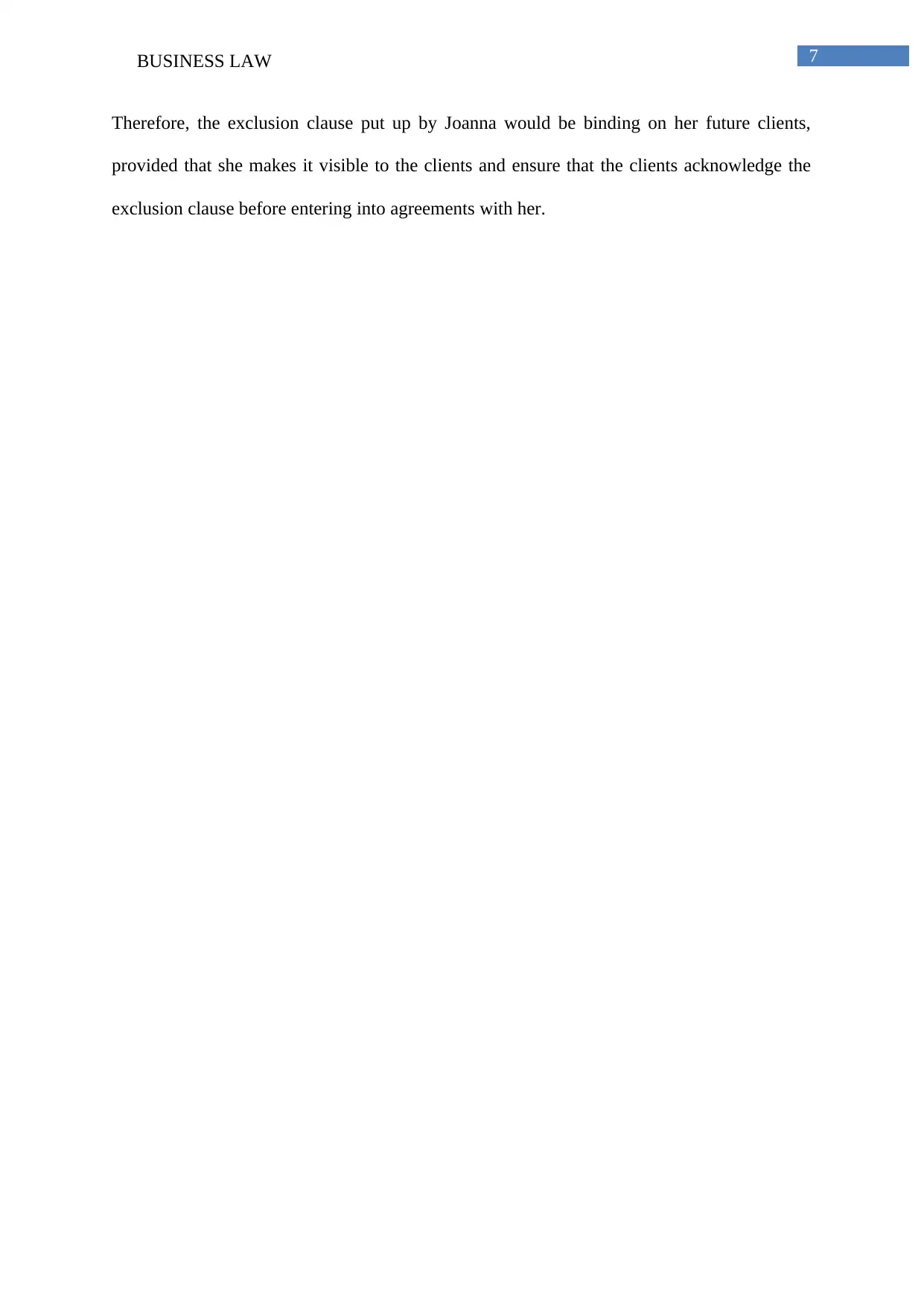
7BUSINESS LAW
Therefore, the exclusion clause put up by Joanna would be binding on her future clients,
provided that she makes it visible to the clients and ensure that the clients acknowledge the
exclusion clause before entering into agreements with her.
Therefore, the exclusion clause put up by Joanna would be binding on her future clients,
provided that she makes it visible to the clients and ensure that the clients acknowledge the
exclusion clause before entering into agreements with her.
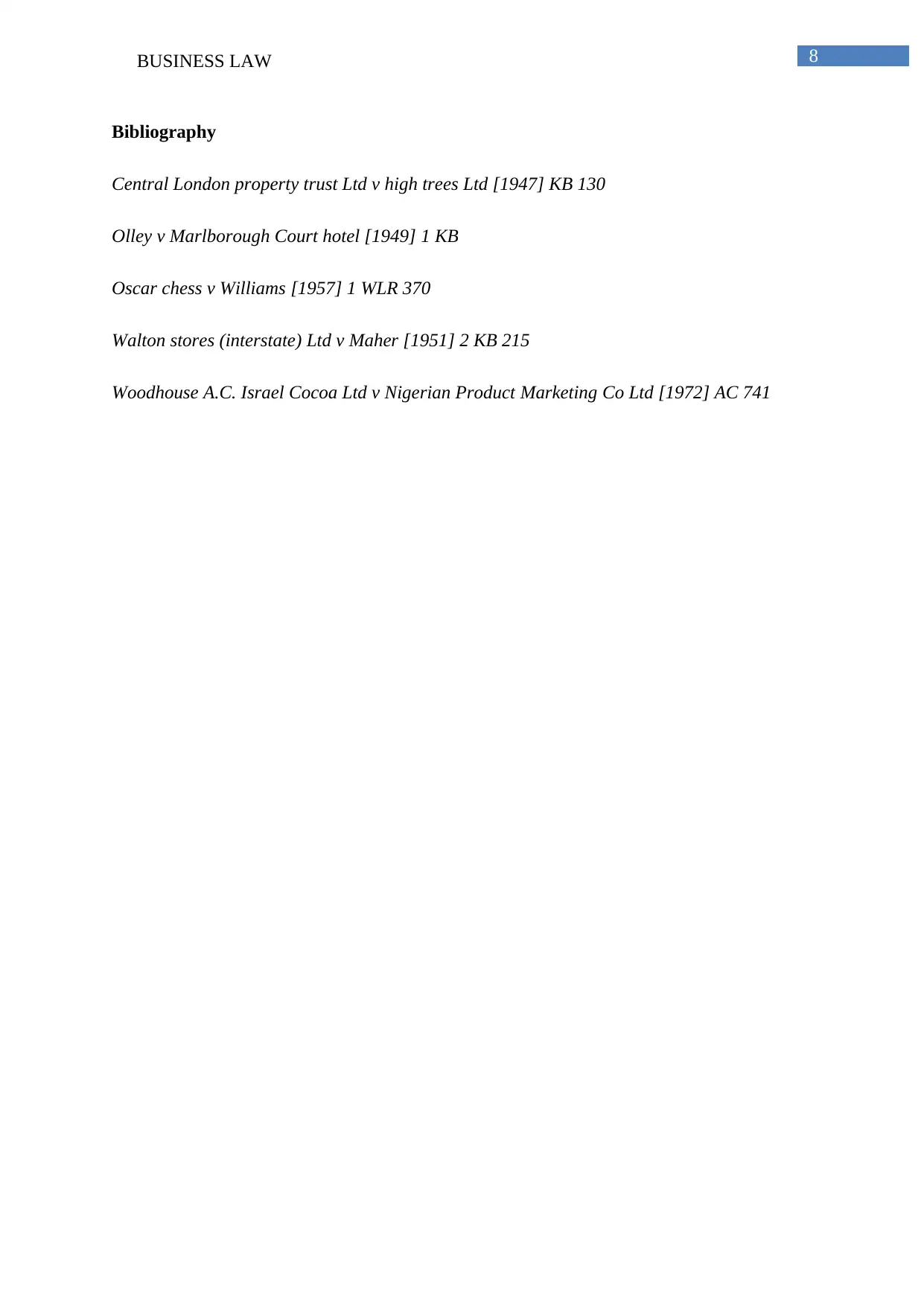
8BUSINESS LAW
Bibliography
Central London property trust Ltd v high trees Ltd [1947] KB 130
Olley v Marlborough Court hotel [1949] 1 KB
Oscar chess v Williams [1957] 1 WLR 370
Walton stores (interstate) Ltd v Maher [1951] 2 KB 215
Woodhouse A.C. Israel Cocoa Ltd v Nigerian Product Marketing Co Ltd [1972] AC 741
Bibliography
Central London property trust Ltd v high trees Ltd [1947] KB 130
Olley v Marlborough Court hotel [1949] 1 KB
Oscar chess v Williams [1957] 1 WLR 370
Walton stores (interstate) Ltd v Maher [1951] 2 KB 215
Woodhouse A.C. Israel Cocoa Ltd v Nigerian Product Marketing Co Ltd [1972] AC 741
⊘ This is a preview!⊘
Do you want full access?
Subscribe today to unlock all pages.

Trusted by 1+ million students worldwide
1 out of 9
Related Documents
Your All-in-One AI-Powered Toolkit for Academic Success.
+13062052269
info@desklib.com
Available 24*7 on WhatsApp / Email
![[object Object]](/_next/static/media/star-bottom.7253800d.svg)
Unlock your academic potential
Copyright © 2020–2026 A2Z Services. All Rights Reserved. Developed and managed by ZUCOL.

![Detailed Case Analysis: Contract Law Issues in Business - [Module]](/_next/image/?url=https%3A%2F%2Fdesklib.com%2Fmedia%2Fimages%2Fbp%2F21fe1e6ab8ee47e1b904ddfd70315544.jpg&w=256&q=75)



